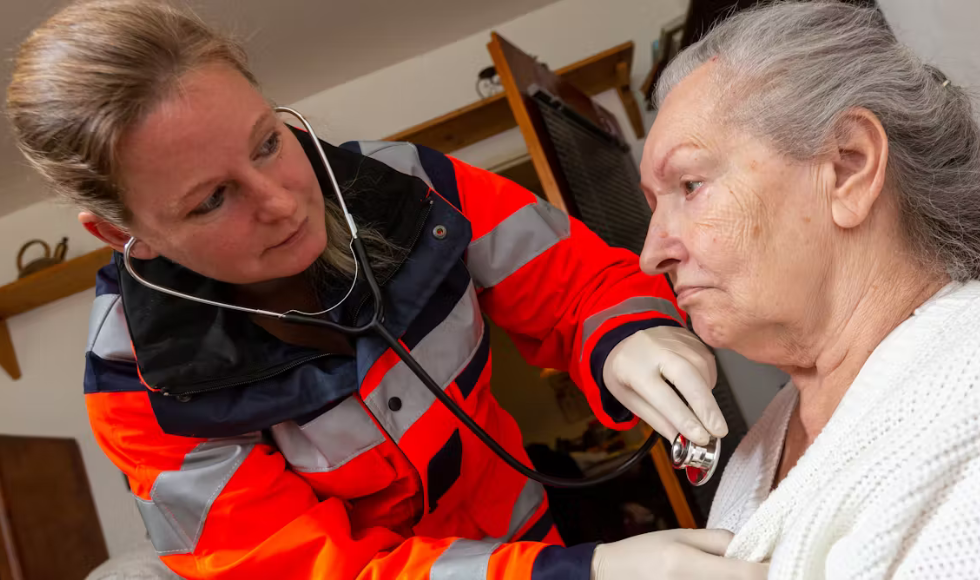Analysis: Paramedics treating patients’ palliative needs at home benefits everyone

It’s not uncommon for patients with palliative care needs to call 9-1-1 when they are in distress due to issues such as breathing difficulties, nausea or falling. (Shutterstock)
BY Jean-Eric Tarride
August 6, 2024
![]() This article is republished from The Conversation under a Creative Commons license. Read the original article.
This article is republished from The Conversation under a Creative Commons license. Read the original article.
In a medical system that seems to be under constant bombardment — economic, pandemic, demographic — it’s refreshing to see solid evidence to support a new idea that improves care while saving valuable time and money.
It’s exactly what has been happening in several Canadian provinces that have been implementing innovative palliative programs to improve paramedic support to patients with palliative care needs. The idea is that paramedics, with some extra training, can provide patient-centred care in the homes of people living with cancer and other life-limiting conditions. It is intended to make patients as comfortable as possible as they spend their last days at home, which is where most Canadians say they’d prefer to die.
Palliative care at home
It’s not uncommon for patients with palliative care needs to call 9-1-1 when they are in distress due to issues such as breathing difficulties, nausea or falling. This is often the situation when 24-hour/seven-days-a-week palliative care support is not available — which is nearly everywhere in Canada.
About 90 per cent of the time, when an individual with palliative care needs or a family member calls 9-1-1 for an ambulance, it means a trip to a hospital emergency department for the patient and two paramedics, who all wait together until the hospital can take the patient into its care.
Whether measured in time or money, it is an expensive way to provide care, and that does not include the opportunity costs of paramedics waiting hours to transfer a patient to hospital staff.
A long wait in the emergency department may use up a significant amount of the precious time a patient may have left to live, and can add considerable stress for patients and their families who are already facing significant hardship. Emergency departments are also noisy and overcrowded, which is less than ideal for patients and their families.
By enabling trained paramedics to provide palliative and end-of-life care in the home when appropriate, patients with palliative care needs would save the time and stress of hospital visits. Emergency departments would be less congested, and paramedics would spend more of their time directly caring for patients rather than being tied up waiting to transfer patients into hospital care.
Training paramedics for palliative care
Between 2011 and 2013, Nova Scotia, Alberta, and Prince Edward Island launched programs to train paramedics to treat patients’ palliative needs at home, with support from the Canadian Partnership Against Cancer (CPAC) in Nova Scotia and Prince Edward Island.
Based on this experience and in collaboration with several health-care providers, the Canadian Partnership Against Cancer (CPAC) and Healthcare Excellence Canada (HEC) provided support and funding to spread this approach across Canada through the “Paramedics and Palliative Care: Bringing Vital Services to Canadians” Program.

Under this program, more than 7,500 paramedics and 200 additional health-care providers across seven provincial teams in British Columbia, Saskatchewan, Manitoba, Ontario, New Brunswick and Newfoundland and Labrador were trained between 2018 and 2022 to provide palliative and end-of-life care at home for patients who have a palliative emergency, require pain and symptom management or have an unexpected health event.
Saving time and money
To provide evidence for supporting a Canada-wide implementation of paramedic palliative care at home models, a team from McMaster University’s Centre for Health Economics and Policy Analysis worked with CPAC, HEC and paramedic representatives to evaluate the economic viability of the program.
Data from more than 5,000 palliative-care 9-1-1 calls from April 1, 2020, to March 31, 2022 showed that 60 per cent of 9-1-1 calls resulted in patients receiving care at home without transport to an emergency department, while paramedics saved an average 31 minutes of their time per call.
The program was estimated to save $2,773 per 9-1-1 call, which offset the program costs estimated at $493 per call, for a return of $4.60 for each dollar invested. Other results showed that patients and families were highly satisfied with the program while paramedic comfort and confidence with palliative and end of life care improved.
Supporting the universal implementation of paramedic-based palliative care at home programs in Canada means more paramedics will need to be trained to treat patients with palliative needs at home.
Of course, some patients with palliative care needs calling 9-1-1 will still need to be transported to the hospital to receive care that only physicians can provide, and some patients may simply prefer to be seen at the hospital rather than have paramedics treat them at home.
Still, the evidence clearly shows that enabling paramedics to provide home-based palliative care when appropriate creates a substantial benefit for everyone involved — classic win-win-win for patients, health-care providers and health-care systems.
Jean-Eric Tarride, Professor, McMaster Chair in Health Technology Management, McMaster University
This article is republished from The Conversation under a Creative Commons license. Read the original article.


